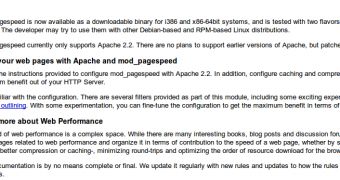Google's love affair with 'speed' is a downright obsession, not that anyone's complaining. The company is not content with speeding up its own products, it wants everyone else to be faster as well and the latest move towards this is a new module for the very popular Apache web server, dubbed mod_pagespeed, which promises to, what else, speed up websites hosted with Apache.
"[W]e’re introducing a module for the Apache HTTP Server called mod_pagespeed to perform many speed optimizations automatically," Richard Rabbat, from Google's ‘Make the Web Faster’ initiative, wrote.
"We’re starting with more than 15 on-the-fly optimizations that address various aspects of web performance, including optimizing caching, minimizing client-server round trips and minimizing payload size," he explained.
Google already has a number of tools to help developers and webmasters speed up their sites. The Page Speed browser extension, for example, tests your site for a number of common issues and suggests what could be done to make it faster.
The company says that the extension is already used by 1.2 million developers, but Google wanted to do more than just provide suggestions and diagnose what's wrong, it wanted to provide solutions as well.
Mod_pagespeed is a collection of optimizations that are all designed to do one thing, speed up the web. Google says that in its testing, websites were, on average, two times as fast, page loads were cut in half.
On a case-by-case basis, the performance boost could be even greater or, of course, lower depending on how optimized the site already is.
Mod_pagespeed doesn't do anything that a determined webmaster couldn't do by hand, but it does automate some of the more tedious tasks. Here are the things that mod_pagespeed is best at, according to Google:
- Making changes to the pages built by the Content Management Systems (CMS) with no need to make changes to the CMS itself;
- Recompressing an image when its HTML context changes to serve only the bytes required;
- Extending the cache lifetime of the logo and images of your website to a year, while still allowing you to update these at any time. Google has already partnered with GoDaddy which will implement mod_pagespeed for many of the 8.5 million websites it hosts. It's unclear if the tool will be enabled by default or it will be optional.
Google has also partnered with Cotendo to deploy mod_pagespeed with its content delivery network.
The module is available for everyone hosting their own servers, or with low-level access to their hosting solution. Mod_pagespeed is open-source and Google has packaged it for CentOS/Fedora (aka Red Hat-based distros), Debian-based ones and also makes it available as a stand-alone module for everyone else.

 14 DAY TRIAL //
14 DAY TRIAL //